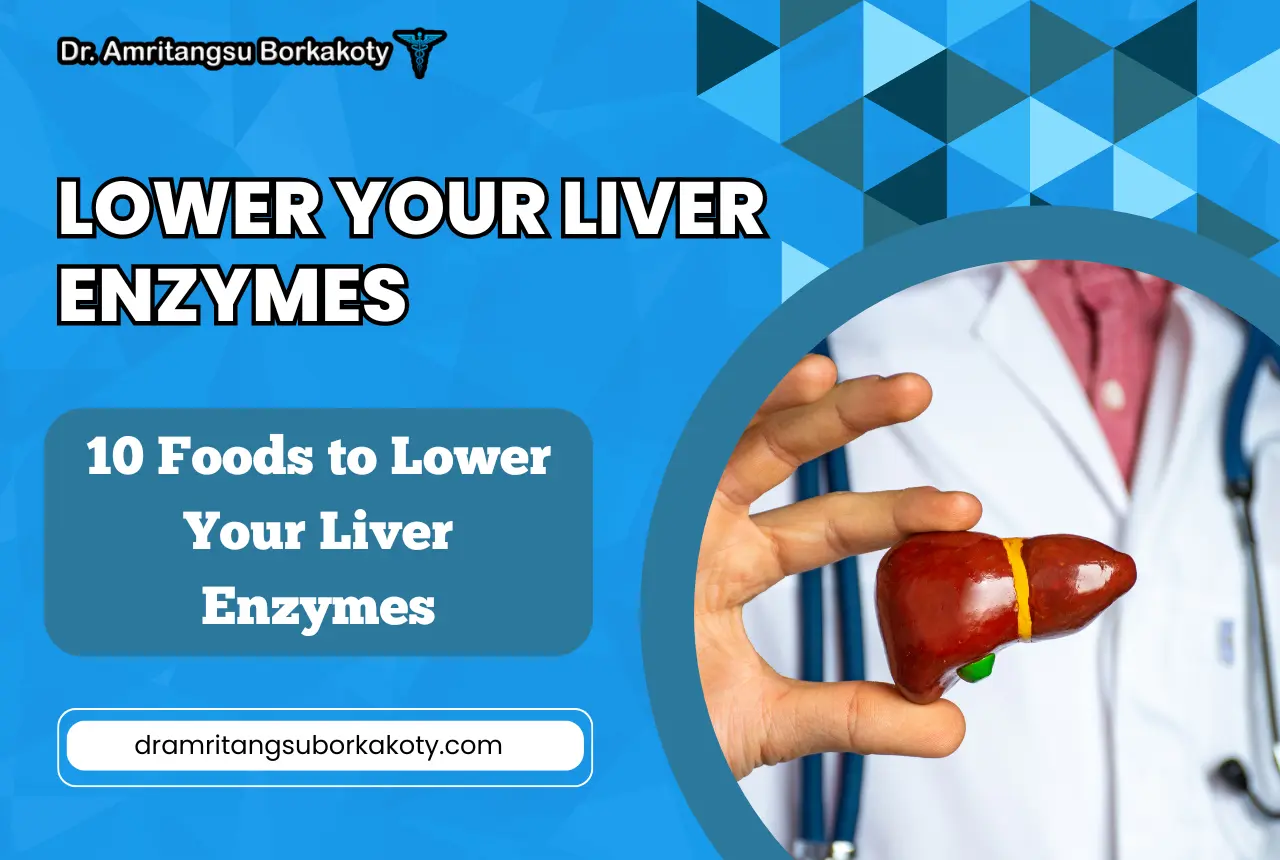
-
 Posted By Dr. Amritangsu Borkakoty
Posted By Dr. Amritangsu Borkakoty -
-
Comments 0
The choice of food to lower liver enzymes is important because the liver is a key organ that serves an important function in our bodies. It detoxifies toxic substances, produces bile for digestion, and stores critical nutrients. The liver’s proper function contributes to general health and well-being.
Liver enzymes are proteins made by liver cells. They are necessary for several metabolic functions. However, increased levels of certain liver enzymes, such as ALT (alanine aminotransferase) and AST (aspartate aminotransferase), may indicate liver injury or inflammation. Several reasons can cause increased liver enzymes, including alcohol intake, viral infections, fatty liver disease, and some drugs.
In this post, we’ll look at ten natural foods that can help maintain good liver function and potentially lower increased liver enzymes. By integrating these items into your diet, you may take proactive efforts to nourish your liver and encourage peak function.
10 Foods to Lower Liver Enzymes Naturally
1. Coffee

Coffee has been the subject of various research looking at its potential health benefits. One area of concern is the effect on liver health. Some study suggests that moderate coffee drinking may be linked to decreased levels of liver enzymes. This could be due to the presence of antioxidants and other substances in coffee, which protect the liver from harm.
Both caffeinated and decaffeinated coffee have been demonstrated to improve liver health. While caffeine may contribute to some of the positive effects, it’s worth noting that decaf coffee can also be beneficial.
It is critical to understand that individual reactions to coffee might differ. If you have any underlying health ailments or concerns, it’s always recommended to contact with a healthcare practitioner before making any adjustments. Change your diet, including boosting your coffee consumption.
2. Cruciferous Vegetables
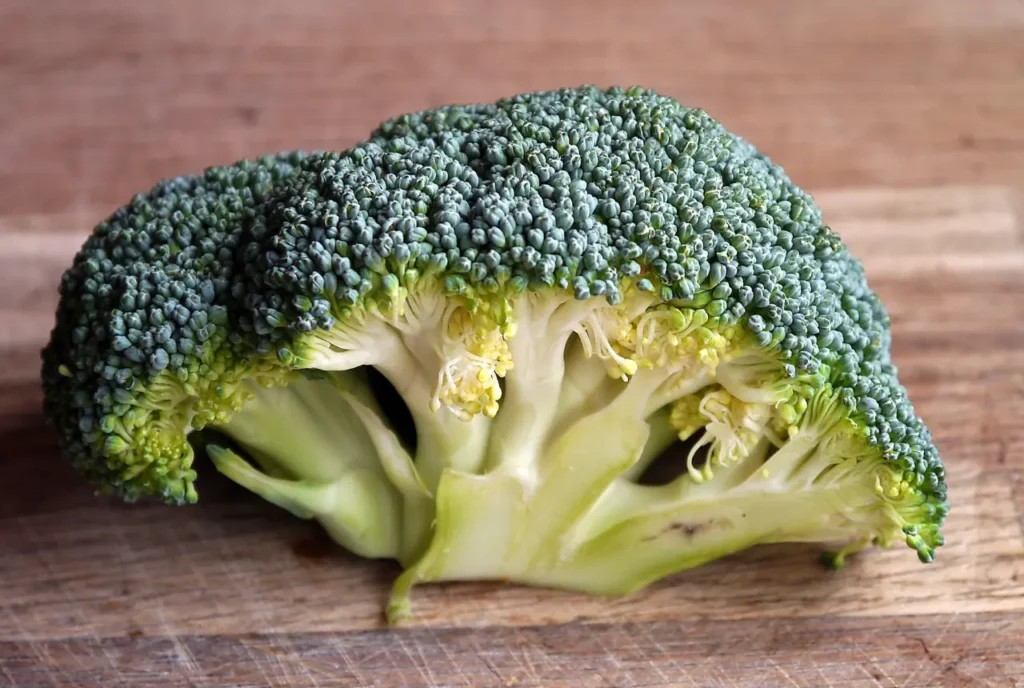
Cruciferous vegetables, like broccoli, Brussels sprouts, kale, and cauliflower, are nutritious powerhouses that can improve liver health. These veggies are high in antioxidants, particularly vitamins C and E, which help protect cells from damage. They also include sulforaphane, a chemical that may help the liver detoxify by breaking down toxic compounds.
Cruciferous vegetables are also known for their anti-inflammatory benefits. Chronic inflammation can cause liver damage, therefore including these veggies in your diet may help reduce inflammation and promote overall liver health.
3. Green Tea
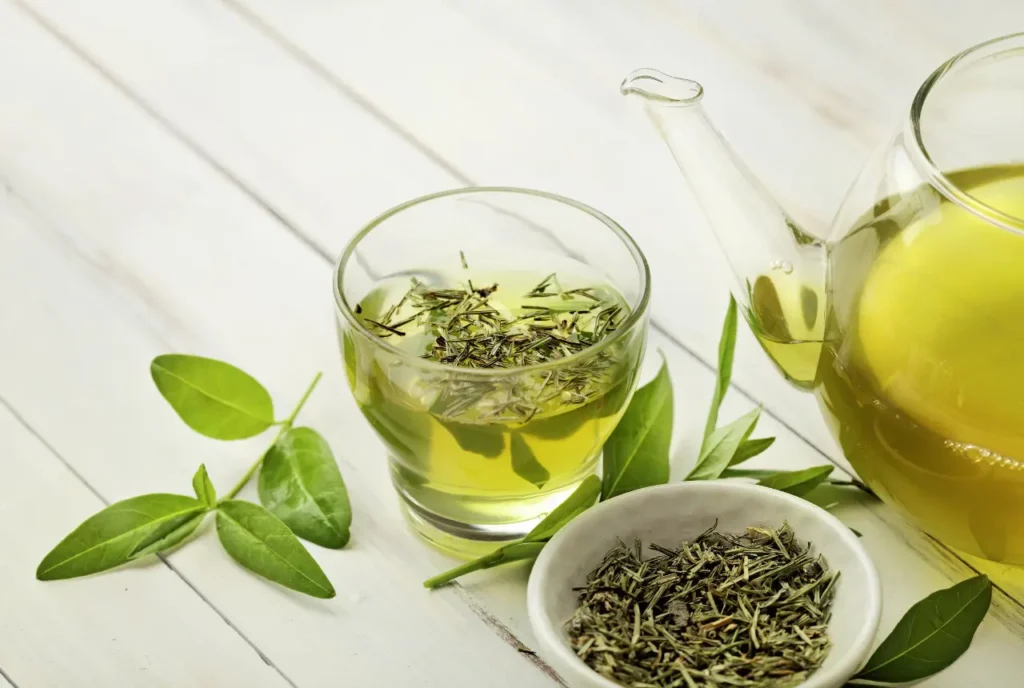
Green tea is gaining popularity for its possible health advantages, particularly its ability to improve liver health. Some research suggests that drinking green tea may be connected with decreased levels of liver enzymes, particularly in people with nonalcoholic fatty liver disease (NAFLD).
Green tea’s antioxidants, known as catechins, are thought to be responsible for its therapeutic effects. Catechins have been found to protect liver cells from injury and may help reduce inflammation, which is a major cause in NAFLD.
4. Fatty Fish
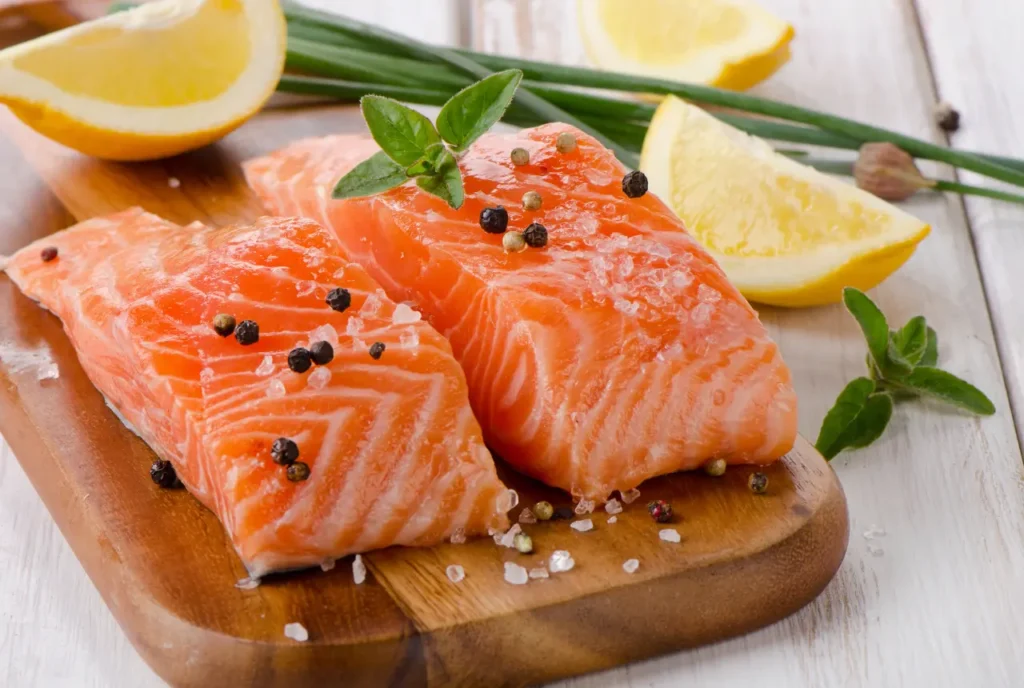
Fatty fish, such as salmon, tuna, and sardines, are rich in omega-3 fatty acids. These good fats have been demonstrated to provide a variety of health benefits, including improved liver function.
Omega-3 fatty acids can help reduce inflammation, a major cause of liver disease. Incorporating fatty fish into your diet may help to enhance liver function and lower your chance of developing liver disease.
If you are a vegetarian, you can still get omega-3 fatty acids from plant-based foods such as flaxseeds and walnuts. However, these sources may not contain the same comprehensive omega-3 profile as fatty fish.
5. Whole Grains
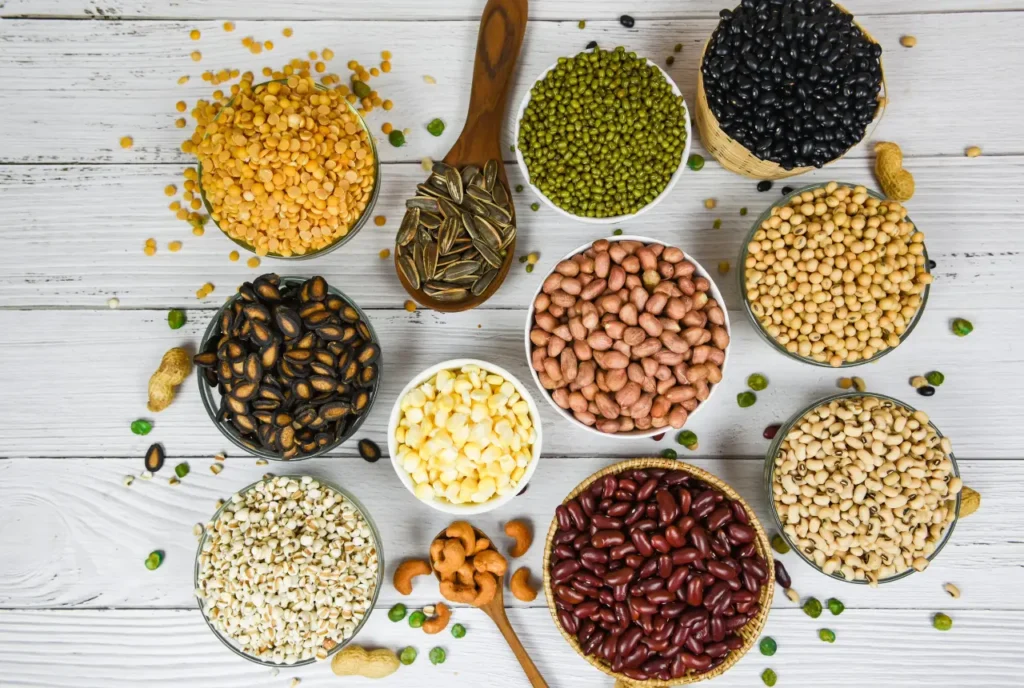
Whole grains are an important element of a healthy diet and can help your liver function properly. Whole grains contain fibre, which promotes a healthy digestive tract and reduces the stress on the liver. Whole grains also give prolonged energy, which helps to maintain blood sugar levels and reduces stress on the liver.
Muesli, brown rice and quinoa are all good examples of healthy grains that can be included in your diet. These grains are high in fibre, vitamins, and minerals, making them an excellent choice for promoting general health and liver function.
6. Fruits High in Antioxidants
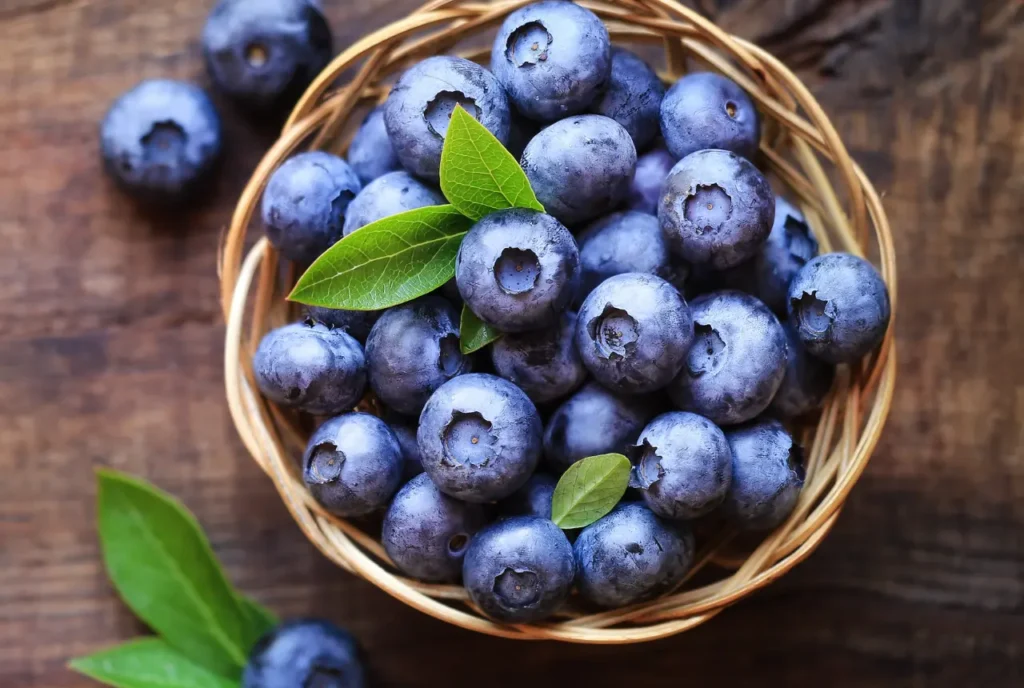
Berries such as blueberries, raspberries, cranberries, and grapes are high in antioxidants. These substances, which include anthocyanins and polyphenols, help to protect cells from free radical damage.
Antioxidants may play an important role in protecting liver cells from oxidative stress, which can lead to inflammation and illness. By including these fruits in your diet, you may be able to lower the risk of liver damage and improve its general health.
7. Nuts and Seeds
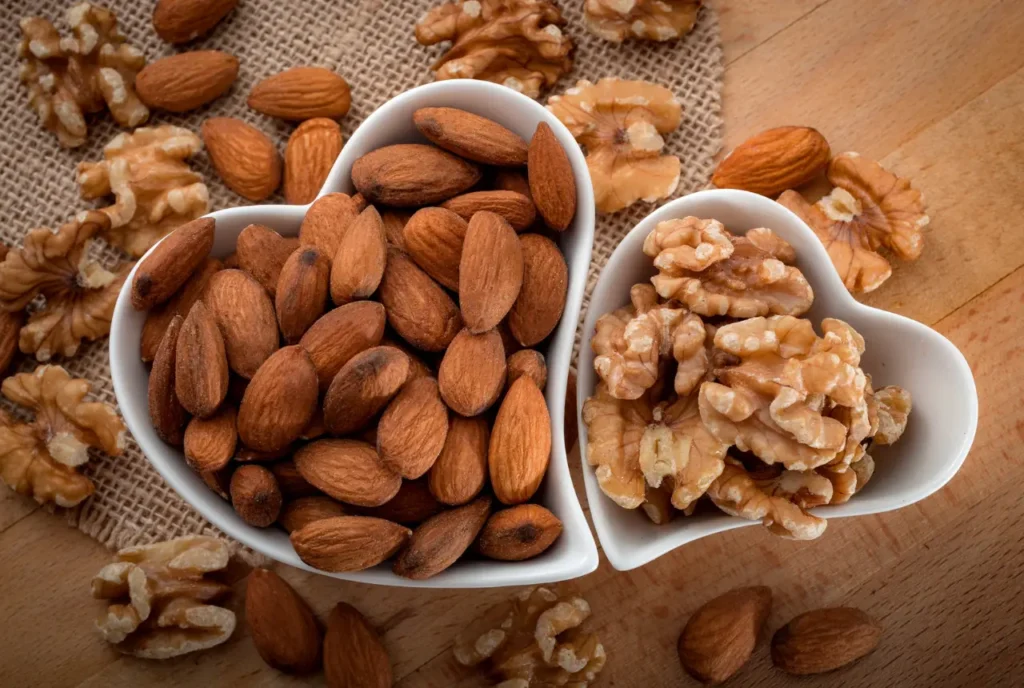
Nuts and seeds provide healthful lipids, vitamin E, and antioxidants. Almonds, walnuts, and pistachios are wonderful nuts for liver health.
The beneficial fats found in nuts and seeds can assist maintain liver function and prevent inflammation. Vitamin E is an antioxidant that protects cells from harm; additional antioxidants present in nuts may help benefit liver health. Incorporating nuts and seeds into your diet can feed your liver with important nutrients and help it function properly.
8. Garlic
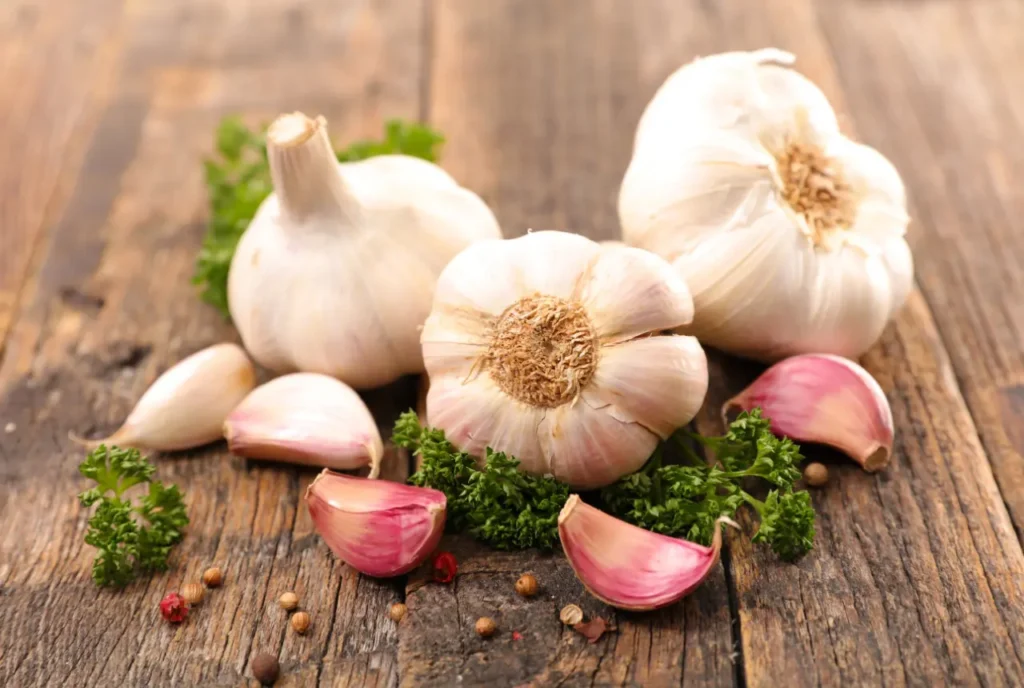
Garlic has been used for centuries for its therapeutic benefits, and some study suggests that it may also improve liver function. Garlic has chemicals with anti-inflammatory and antioxidant characteristics that may help protect the liver from injury.
While some studies have yielded encouraging outcomes, additional research is required to completely understand the particular processes by which garlic may help liver function. It’s crucial to note that eating too much garlic can create adverse effects, so stick to a moderate amount.
9. Olive Oil
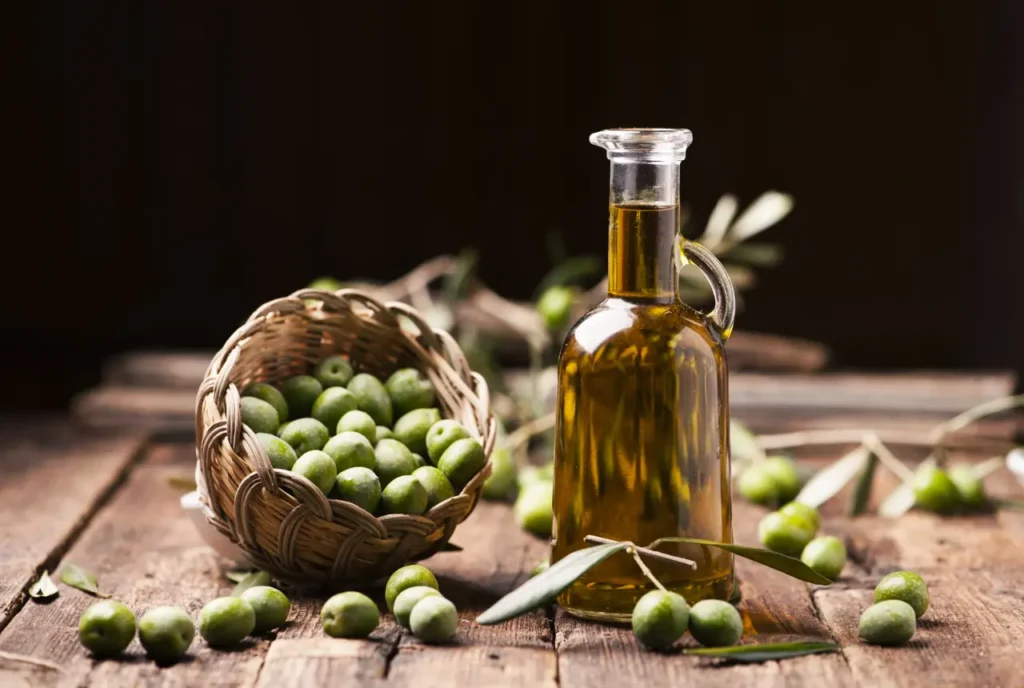
Olive oil is a common ingredient in Mediterranean diets and has been linked to numerous health benefits. It contains a high concentration of monounsaturated fats, which are considered good fats. These fats can help reduce inflammation, a major cause of liver disease.
By including olive oil in your diet, you may be able to improve liver function and lower your risk of liver disease. However, it is vital to eat olive oil in moderation, as excessive use might result in weight gain.
10. Legumes
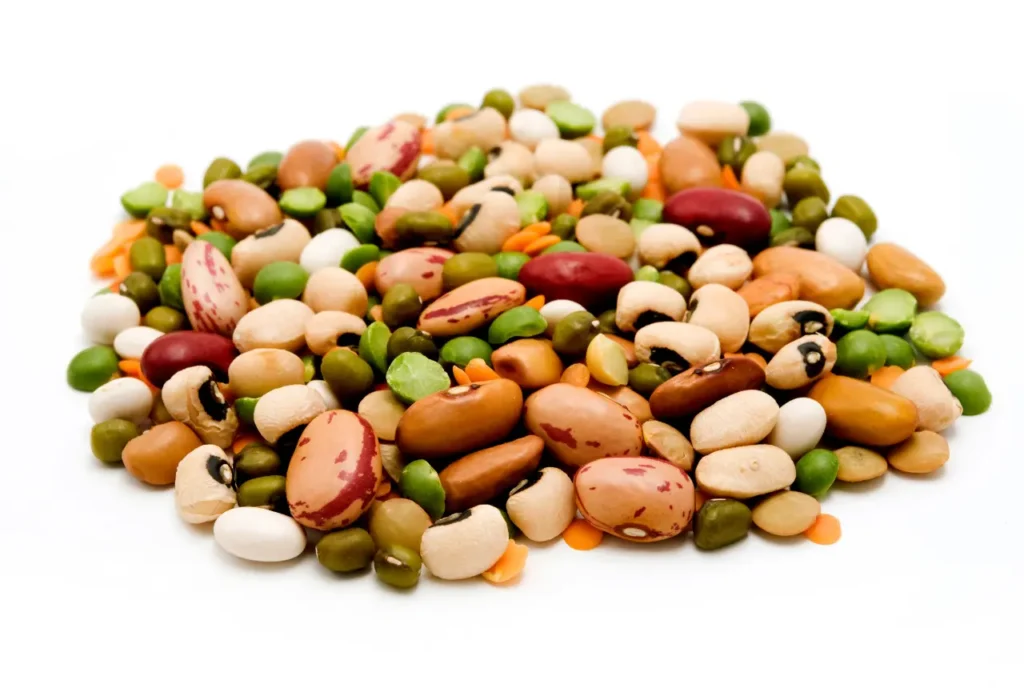
Lentils, beans, and peas are excellent sources of plant-based protein and fibre. They can make you feel full and satisfied, minimising your chances of overeating and putting needless strain on your liver.
Legumes can also help control blood sugar levels, easing the strain on the liver. By including beans in your diet, you may offer your body with critical nutrients, support liver health, and improve overall wellness.
Lifestyle Modifications for Optimal Liver Health
In addition to dietary changes, adopting healthy lifestyle habits can significantly contribute to liver health. Here are some key lifestyle modifications to consider:
1. Maintain a Healthy Weight: Excess weight can put stress on the liver and increase the risk of liver disease. Aim to maintain a healthy weight through a balanced diet and regular exercise.
2. Limit Processed Foods and Added Sugars: Processed foods often contain unhealthy fats, excessive sodium, and added sugars, which can contribute to liver damage. Opt for whole, unprocessed foods and minimize your intake of sugary beverages and snacks.
3. Stay Active: Regular exercise can help improve liver function and overall health. Aim for at least 30 minutes of moderate-intensity exercise most days of the week.
4. Prioritize Sleep: Adequate sleep is essential for overall well-being and can also support liver health. Aim for 7-9 hours of quality sleep each night.
5. Manage Stress: Chronic stress can contribute to liver inflammation and damage. Effective stress management techniques, such as meditation, yoga, or deep breathing exercises, can help protect your liver.
6. Avoid Smoking and Excessive Alcohol Consumption: Smoking and excessive alcohol intake are major risk factors for liver disease. If you smoke, quitting is one of the best things you can do for your liver health. Limit your alcohol consumption or avoid it altogether.
By making these lifestyle changes, you can significantly improve your liver health and reduce your risk of liver diseases. Remember, it’s important to consult with a healthcare professional for personalized advice and guidance.
When to See a Doctor
If you are experiencing persistent symptoms such as fatigue, nausea, abdominal pain, or darkened urine, it is important to consult with a healthcare professional. These symptoms could be signs of an underlying liver problem.
Regular checkups with your doctor are also essential for monitoring your liver health. Your doctor may recommend blood tests to assess your liver enzymes and other markers of liver function. In some cases, imaging tests, such as ultrasounds or CT scans, may be necessary to evaluate the condition of your liver.
Early detection and treatment of liver problems can be crucial in preventing serious complications. By following your doctor’s recommendations and seeking medical attention when needed, you can take proactive steps to protect your liver health.
Rewinding the Important Points:
By including the ten foods recommended in this article into your diet, you can significantly improve your liver health. These foods provide nutrients that can help protect the liver from injury, reduce inflammation, and improve overall liver function.
Remember that a healthy diet is only one part of the puzzle. Lifestyle changes, such as keeping a healthy weight, exercising frequently, managing stress, and avoiding dangerous substances, are also essential for liver health. If you are concerned about your liver’s health, you should speak with a healthcare professional for personalised advice and guidance.
Recent Posts
- Common Causes of Stomach Ulcers and Effective Treatment Options
- Early Symptoms of Liver Damage: How to Spot the First Warning Signs Before It’s Too Late
- Best Treatment for Hepatitis B and C: Your Complete Guide to Symptoms, Care, and Prevention
- How to Reduce Liver Inflammation Fast: 5 Proven Tips for Rapid Liver Recovery
- Why You Shouldn’t Ignore NAFLD: 5 Shocking Health Risks You Need to Know



